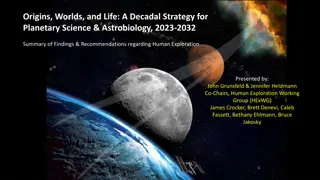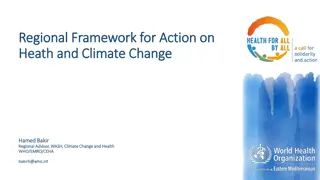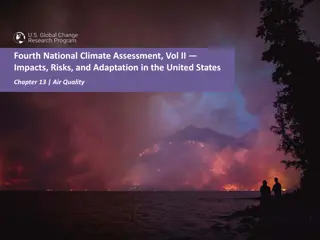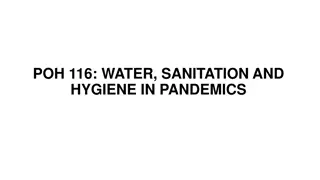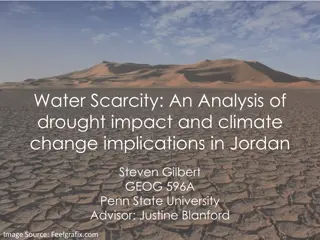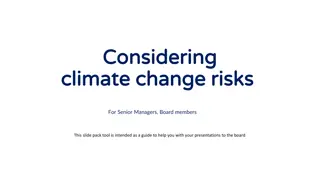Understanding Planetary Health, Climate Change, and Pandemics
This educational content delves into the concepts and principles of planetary health and climate change, exploring the interrelationships between ecosystems, animals, and human health. It highlights the far-reaching effects of human and animal interactions on the environment, emphasizing practical interventions for the well-being of both humans and the planet. Definitions of planetary health, One Health, and EcoHealth are provided, underscoring the importance of considering human health within broader natural systems. The focus on planetary health aims to address the threats posed by societal structures and environmental risks to ensure the sustainable existence of humanity within safe planetary boundaries.
Download Presentation

Please find below an Image/Link to download the presentation.
The content on the website is provided AS IS for your information and personal use only. It may not be sold, licensed, or shared on other websites without obtaining consent from the author. Download presentation by click this link. If you encounter any issues during the download, it is possible that the publisher has removed the file from their server.
E N D
Presentation Transcript
POH 101: PLANETARY HEALTH, CLIMATE CHANGE AND PANDEMICS
Objectives This topic enables learning about: -Concepts and principles of planetary health and climate change -Interrelationships between ecosystems, animal, and human health -Analyzing far-reaching effects of animal and human interactions on the environment -Practical interventions that provide co-benefits for human and environmental health
Expected Learning Outcomes: At the end of this topic, the learner should be able to: 1. Explain concepts and principles of planetary health and climate change 2. Describe interrelationships between ecosystems, animal, and human health 3. Analyze far-reaching effects of animal and human interactions on the environment 4. Apply practical interventions that provide co-benefits for human and environmental health
Definitions - Planetary health The achievement of the highest attainable standard of health, wellbeing, and equity worldwide through judicious attention to the human systems political, economic, and social that shape the future of humanity and the Earth s natural systems that define the safe environmental limits within which humanity can flourish Planetary health is the health of human civilization and the state of the natural systems on which it depends (Lancet Commission on Planetary Health).
Definitions- distinguish between.. One Health - the collaborative effort of multiple health science professions, together with their institutions working locally, nationally, and globally to attain optimal health for people, domestic animals, wildlife, plants, and our environment. EcoHealth which is involving the health of humans, animals, and ecosystems, including also environmental sustainability and socioeconomic stability in the framework. EcoHealth aims for sustainable human and animal health and well- being, through healthier ecosystems. related disciplines, and
Why focus on planetary health It situates human health within human systems. The threats that our species faces are not abstract physical risks, such as disease, climate change, ocean acidification, or chemical pollution. The risks we face lie within ourselves and the societies we have created Planetary health concerns the natural systems within which our species exists for example, the health and diversity of the biosphere. Human beings live within a safe operating space of planetary existence. If the boundaries of that space are breached, the conditions for our survival will be diminished
Greatest threats to planetary health Climate change Greenhouse effect Carbon dioxide emissions Migrant/refugee crisis Conflicts/crimes/violence Infectious diseases and other public health threats Disparity between wealth and poverty Loss of biodiversity
Linkage between climate change, migration, and health
Linkage between climate change, migration, and Linkage between climate change, migration, and health health Climate change is known to affect populations health through direct exposures such as heatwaves or extreme weather events, although less direct impacts arise from disruptions to environmental, ecological, and social systems. The indirect impacts arising from environmental, ecological and social systems will affect human health through changes in food yields, freshwater flows and quality, stability of infectious disease patterns, air quality, social cohesion, and family income and livelihoods This effect is particularly alarming in regions that are already facing food insecurity such as in sub- Saharan Africa and south Asia. The occurrence of flooding or drought cycles as well as hotter summers in some regions are likely to increase risks to agricultural productivity. Climate change will also impact the geographical range, seasonality, and incidence of various infectious diseases, such as malaria, diarrheal diseases, and cholera These impacts, especially extreme weather events, sea-level rise, soil degradation, and food and water scarcity are strongly associated with migration. In some cases migration will be a strategy of last resort, with people left with no other choice as a result of loss of habitable land, extreme health risks, or deteriorating livelihoods. In this case, displacement might increase the risks of adverse health outcomes, in particular for vulnerable groups such as children and the elderly, as well as those who are already suffering from (chronic) illnesses. Migration can also be a voluntary choice, although forced migration and voluntary migration are not two discrete categories, but rather the two ends of a continuum Moving to a new location might avoid the hazards from extreme weather events and damaged physical environment, improve health suffering from undernutrition or freshwater shortages, and eventually enhance access to health care
Key domains in Planetary health education: a Key domains in Planetary health education: a framework framework Source: Guzman et al., 2021
Key domains First, interconnection within nature. Fostering compassion for planet Earth through the recognition of the personal, cognitive, social, and emotional aspects of the education process is the central element of the framework Second, the Anthropocene and health. The Anthropocene is characterized by massive disruptions in earth system processes that have resulted from the ballooning of humanity s ecological footprint.6 This domain focuses on the understanding of how specific anthropogenic impacts on Earth s natural systems are connected to health outcomes
Key domains cont.. Third, systems thinking and complexity. The field of planetary health draws upon approaches to systems thinking that have long been a focus in the field of ecology and describes how various elements interact and coalesce as part of complex systems Fourth, equity and justice. Equity and justice in planetary health are founded on the rights of humans and the rights of nature, giving all human populations and ecosystems, present and future, the opportunity to attain their full vitality. Realizing equity and justice requires eliminating systemic disparities so that no population carries disproportionate burdens of environmental and health impacts while others are able to thrive. Fifth, movement building and systems change. Effective movement building is needed to solve the urgent planetary health crisis. Contrary to popular belief, movements do not simply emerge in response to a given moment. Action requires inclusive relationships, thoughtful strategy, effective communication, and transformational partnerships. This domain addresses these elements so learners and future professionals can build effective movements to support systems change and the great transition to a just future. Mentorship, solidarity, and the development of concrete skill sets help to reduce apathy, increase engagement, and create much-needed momentum for change
Principles of planetary health 1. A planetary health - will enable one to have an understanding and appreciation of the crucial linkages, cause effect relationships, and feedback loops between environmental change and human health. 2. Urgency and scale-The field of planetary health is driven by the scale of environmental change, its effects on human health, and the urgency with which the global population must respond 3. Policy-Planetary health is intrinsically policy oriented. By quantifying the effect on human health effects of anthropogenic environmental changes and communicating them to stakeholders at many levels, collaborative work can be done across sectors to identify policies and practices, both local and global, to protect and improve the health of global populations
Principles of planetary health cont.. 4. Organizing and movement building-develop an understanding of the role that organizing in the community and movement building has in the political process both locally and globally. 5. Communication-develop an understanding of the variety of communication methods available and how to select the best suite of tools as they work to convey the challenges and solutions of planetary health to diverse audiences. An appreciation for the importance of listening as a part of effective communication is vital. 6. Systems thinking and transdisciplinary collaborations-develop sustainable solutions for the challenges of planetary health that overcome existing gaps in research design and associated policy development.
Principles of planetary health cont.. 7. Inequality and inequity-Understanding the differences between equality and equity in theory and practice, and concepts of marginalization, vulnerability, resilience, and who benefits. The effects of environmental change on human health are heterogeneous and one should think critically about whose health is at stake and how it is measured 8. Bias-learn to identify potential biases in planetary health research and be aware of the vested interests of different stakeholders both in support of and against the factors that affect the connection between environmental change and human health 9. Governance-Governance is the high-level strategy used by a leader or leadership team in their processes of decision making and implementation. It is the ability to turn capacity into action and generating the capacity when it does not exist. One should be able to provide some examples of how challenges in planetary health can be created or aggravated by the failures of governing bodies to cooperate across populations, regions, and boundaries, especially where effective cooperative mechanisms are not yet established
Principles of planetary health cont.. 10. Unintended consequences -appreciate that surprising and unexpected consequences of environmental change, both positive and negative, are inevitable. This systemic uncertainty requires a shift in government, corporate, and community mindsets to allow for increased adaptive capacity, and an emphasis on programmes that increase socioecological competence, community resilience, and sustainability 11. Global citizenship and cultural identity-A global citizen is someone who sees themselves as part of the international community and whose actions help define the community s values and practices. One needs to n realize their own cultural identities and recognize their inherent membership in both their local and global communities, they have the opportunity to help define the values and practices of the next generation to positively affect those communities 12. Historical and current global values -An understanding of the past is necessary to solve the problems of the present. To grasp the necessity and urgency of planetary health, students need to be aware of the historical perspectives and milestones that have laid the foundation for the field, including those perspectives that have been historically marginalized or ignored. To identify opportunities for positive interventions, one must recognize patterns over time and appreciate current global context.
Core values of planetary health The health of living and future human generations, applied to individuals, communities, and populations Equity in health, which is related to socioeconomic, regional, and gender factors Sustainability, which is in turn based on natural resources and biodiversity
Planetary health policy Implementation barriers /challenges Implementation involves addressing multiple drivers of change. Successful implementation requires effective institutions, incentives, and governance Widespread and rapid environmental damage Diverse contexts make it difficult to scale up implementation simple, one-size fits-all solutions will not work **Planetary health practitioners can draw on insights from policy research and implementation science, which provide overlapping but distinct approaches to address the gaps between evidence, policy, and practice
References Deem, S. L., Lane-deGraaf, K. E., & Rayhel, E. A. (2019). Introduction to one health: An interdisciplinary approach to planetary health. John Wiley & Sons. Horton, R., & Lo, S. (2015). Planetary health: a new science for exceptional action. The Lancet, 386(10007), 1921-1922. Guzm n, C. A. F., Aguirre, A. A., Astle, B., Barros, E., Bayles, B., Chimbari, M., ... & Zylstra, M. (2021). A framework to guide planetary health education. The Lancet Planetary Health, 5(5), e253-e255. Stone, S. B., Myers, S. S., & Golden, C. D. (2018). Cross-cutting principles for planetary health education. The Lancet Planetary Health, 2(5), e192-e193. Lerner, H., & Berg, C. (2017). A comparison of three holistic approaches to health: One Health, EcoHealth, and Planetary Health. Frontiers in veterinary science, 4, 163. Sch tte, S., Gemenne, F., Zaman, M., Flahault, A., & Depoux, A. (2018). Connecting planetary health, climate change, and migration. The Lancet Planetary Health, 2(2), e58-e59.
Review of The Pandemic Preparedness with One Health approach (PPOH) short course is by the East African Community (EAC) Secretariat in cooperation with universities of the six EAC Partner States. It is facilitated by the German Government and implemented by the Deutsche Gesellschaft f r Internationale Zusammenarbeit GIZ GmbH through the Global Programme Pandemic Prevention and Response, One Health (GP PPOH)
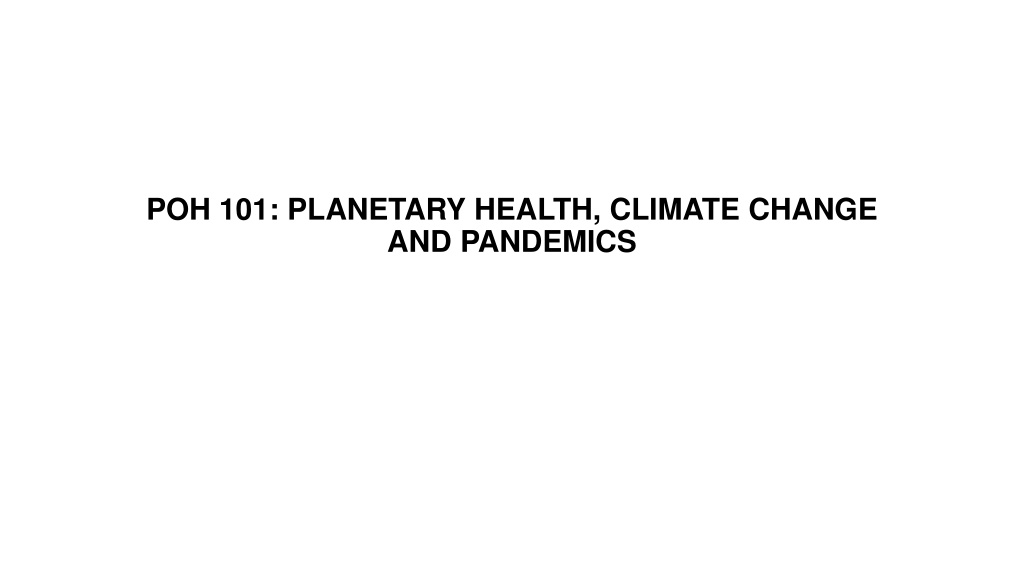


![❤[PDF]⚡ Planetary Ring Systems (Springer Praxis Books)](/thumb/21506/pdf-planetary-ring-systems-springer-praxis-books.jpg)





